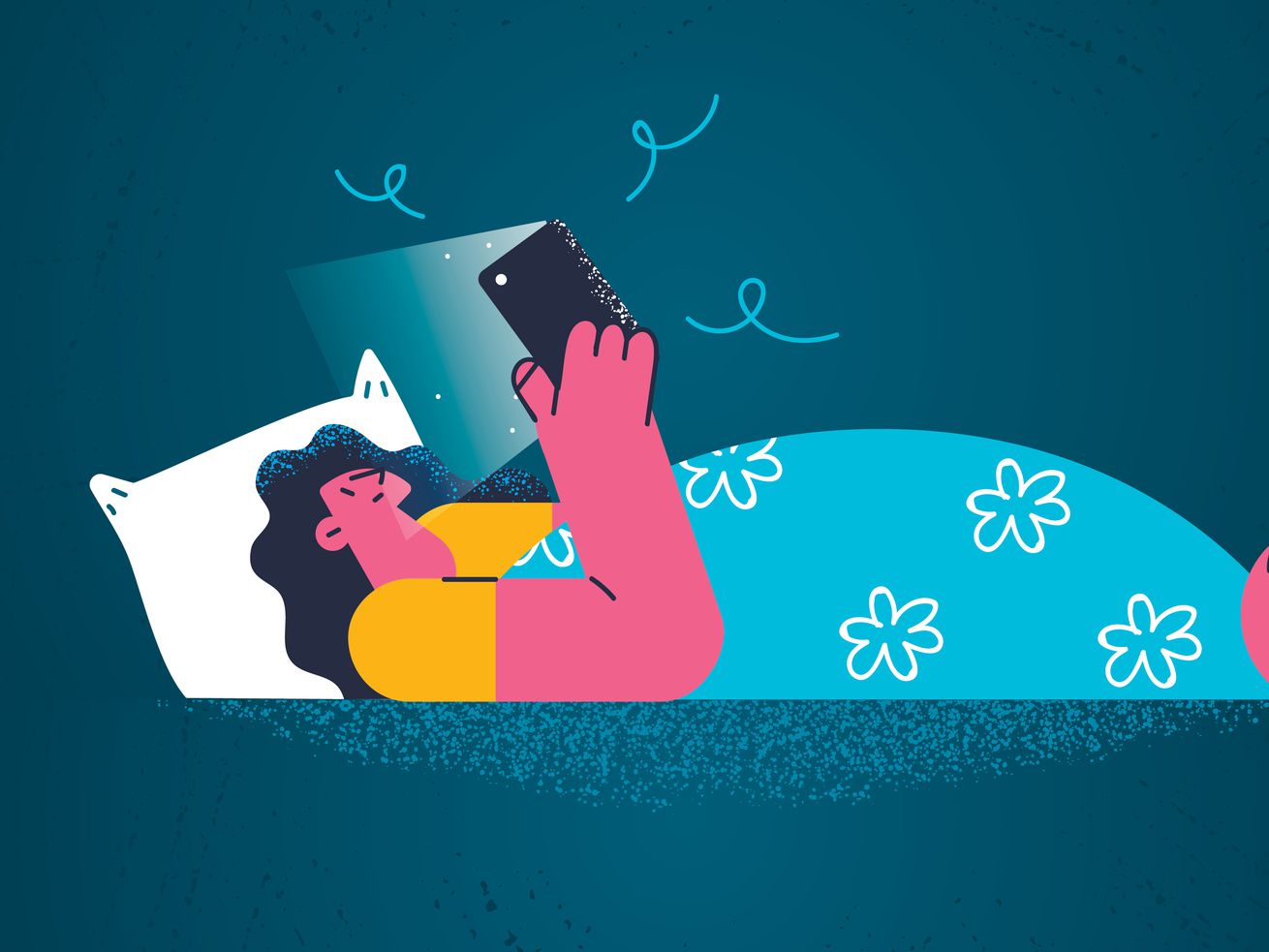Sleep better without sacrificing your tech.
If you’ve ever had a terrible, or even middling, night’s slumber — which studies and surveys suggest is a fair number of people — you’re well aware of the effects of poor sleep. Aside from the sluggishness and lethargy, lack of sufficient shut-eye can blunt thinking and reaction time and negatively impacts judgment. Long-term sleep deprivation has been linked with higher likelihoods of depressive moods, anxiety, diabetes, and obesity.
Difficulty sleeping can be attributed to a variety of factors and isn’t a reflection on how optimized or streamlined your life is. Shift work, children’s inconsistent sleep schedules, stress, bright light in the evening (from both home lighting fixtures and tech), the pandemic, and sleep conditions like insomnia and sleep apnea can all plague a person’s ability to get adequate rest. Sleep deprivation is, ultimately, a systemic issue, and people shouldn’t feel broken for the societal issues impacting sleep.
Despite all of the modern obstacles to sleep, improvement in your quality and quantity of sleep is possible — and you don’t have to lock your phone in another room to achieve it.
Listen to your body
When it comes to sleep, most quantifiers are highly subjective. The Centers for Disease Control and Prevention (CDC) recommends adults get between seven and nine hours of sleep a night, “but the magic number is really dependent on the person,” says sleep psychologist Jade Wu, author of the forthcoming book Hello Sleep: The Science and Art of Overcoming Insomnia Without Medications.
Instead, people should pay attention to how they feel when they wake up and throughout the day, says Vanessa Hill, behavioral scientist, creator of the YouTube series BrainCraft, and researcher at Central Queensland University. Fatigue during the day is a sign your body isn’t getting enough sleep. Survey yourself as to why: Going to bed too late? Trouble falling asleep? Difficulty staying asleep?
To help evaluate how rested you feel during the day, Wu stresses the importance of knowing the difference between “sleepy” and “tired.” Sleepiness manifests in the body: droopy eyelids, an overall heaviness, the entire machine wants to shut down. Tiredness can also present physically, but it often stems from a lack of mental energy, a dip in motivation or inspiration. “If you’re sleepy during the day, that means you did not sleep last night or didn’t get good quality sleep,” Wu says. “If you’re tired during the day, that may not be because of poor sleep. It may be because you’re depressed or bored or dehydrated.”
The cure for sleepiness, Wu says, is, simply but perhaps not obviously, to sleep. Tiredness can be overcome by taking a break during the work day, drinking some water, spending time with friends, or going dancing — not sleeping. “Going to bed might not be the answer and in fact, that might backfire,” Wu says, “because if you’re tired but not sleepy yet and you go to bed, you’re going to have insomnia.”
Rather than forcing yourself into bed at a set time every night and struggling to slip into slumber, take a cue from your body and hit the sheets only when you’re sleepy, Wu says. “Then, we give our bodies a chance to tell us, ‘Here’s what I need,’” she says, “instead of us imposing our idea of how much sleep we need.”
When it comes to the ideal conditions for sleep, try to keep your room as dark, cool, and quiet as possible, Hill says. Again, let your body dictate the most comfortable temperature, which can be different for everyone depending on the weight of their sheets and blankets, what they wear to bed, if they sleep alone or with a partner and pets, and if they run hot or cold. Hill is a proponent of blackout curtains and a white noise machine or smart speaker for keeping light and extraneous sound out of your sleep sanctuary. If you aren’t up for purchasing a new device, iPhones also have a white noise function, and lots of white noise apps are available to download.
However, don’t feel pressured to download sleep tracking apps to measure and analyze your sleep data as it can feed into an unhelpful fixation. “It’s not useful to try to optimize your sleep just for the sake of it,” Hill says.
Fix one thing at a time
Once you’ve figured out the nature of your sleep issues, you’ve got to determine what’s causing them in the first place. This can be difficult, Hill says, because so many factors influence your ability to get shut-eye: screen habits, exposure to light, diet, stress, anxiety, inconsistent work hours. “People need to remember, you can’t change everything,” Hill says.
Out of all the potential deterrents to sleep, figure out which is having the greatest impact. Does work stress keep you up at night? Do you get caught in a TikTok wormhole until the wee hours of the morning? Do your neighbor’s bright backyard lights shine into your window? Does your partner snore? Focus on changing one thing at a time and you’ll be much more likely to maintain that change, Hill says. Potential fixes include listening to a guided meditation before bed to relieve stress, swapping out TikTok for a book, or helping your partner treat their snoring (which may involve a doctor’s visit). Wu also says not to discount sleeping separately from your partner should you have the space if your sleep is affected by sharing a bed. Again, if these solutions are not feasible for you because of space, finances, or work, it is not your fault. Our built environment’s negative impact on sleep is not on you to fix.
It’s also not on you to spend a lot of money, especially at first. Tons of products, devices, and apps are marketed as must-haves for improving sleep, but Hill says to simply do less: cut back on screen time, caffeine (particularly in the afternoon and evening), and alcohol before bed.
Set yourself up for success during the day
A good night’s sleep starts when you’re awake. Sunlight, especially in the morning, helps regulate the circadian rhythm and allows people to fall asleep more quickly and experience less disturbed sleep. Wu suggests getting anywhere from 20 to 30 minutes of sunlight a day to counteract the effects of looking at screens during the evening. “If you go outside during the day and get sunlight, then your screen in the evening will not impact your sleep,” she says, “because the point is that you need to have a big contrast between day versus night in terms of how much sun exposure or how much light exposure you get.”
According to Hill’s research, people often delay their bedtime because they don’t have enough “me time” or time spent socializing during the day, and, as a result, they stay up late catching up on news, scrolling social media, or texting friends. To combat this, Hill suggests interspersing a few short moments of solitude or social interactions during the day — think five minutes of meditation or social media here, a quick 30-minute phone call with a friend there — so you don’t feel the need to binge at night.
In an effort to help combat perhaps one of the most frustrating aspects of sleep — waking up in the middle of the night unable to fall asleep again — Sara E. Benjamin, an instructor of neurology at Johns Hopkins Center for Sleep, says to have a plan for what you’ll do in such situations. You might want to be prepared to put on headphones and listen to a podcast, watch some TV, or have a routine of breathing exercises you turn to in times of stress. Using your phone is fine, but be intentional with its use in your plan and set a time limit for how long you’ll use it. The danger, Benjamin explains, is when people don’t have a plan, reach for their phone, and end up scrolling for hours.
Have a routine
More important than maintaining a consistent bedtime is waking at the same time every day, Wu says, even on the weekends. With an alarm, you have more control over when you rise; at night, you can’t control the hour at which you get sleepy. Waking happens more suddenly than falling asleep and is an effective start to the 24-hour circadian cycle. “When we wake up,” Wu says, “we get up, we become vertical, we open up the blinds, and we get sunlight in our eyes, we start moving, we have breakfast. All of these things tell our metabolism, tell the light-sensing parts of the brain, tell our blood pressure, everything in our bodies that this is the morning.” Your morning routine should include plenty of bright light, Benjamin says, either from natural light or sunrise lamps or SAD lights.
While bedtime should be dictated by when your body naturally gets sleepy, there are things you can do to encourage this process. Successful nighttime routines should help you relax and be easy enough to maintain every day, Hill says, which can include dimming your lights two hours before bedtime, listening to music, meditating, doing light stretches, breath work, having a hot cup of tea, or taking a shower. Just don’t make your nighttime routine another to-do list item. “I don’t think it’s fun to be ‘that girl,’ the internet trend where people have their lives broken up into a spreadsheet, every 15 minutes is accounted for,” Hill says. “I don’t think that’s realistic for everybody to actually maintain.”
It’s important to give your brain time to power down, so don’t try to squeeze in last-minute work or consume stressful or action-packed media. Those things will just wake you up.
Even your naps should have some routine. Crucial for new parents or shift workers, siestas can help improve memory and workplace and physical performance. But too long of a nap too close to when you typically get sleepy can delay your bedtime. Hill says a 30-minute snooze around lunch is beneficial. Fight through the urge to collapse on the couch after work since napping in the early evening would bring you too close to bedtime. If you’re going to become a napper, make sure your rest periods occur around the same time every time you nap so it becomes a part of your schedule.
Be smart about tech
In today’s always-connected world, sleep advice banishing all devices and smartphones to another room is unrealistic. “I need to have my phone next to me because I’m on call for the sleep lab,” Benjamin says. “I can’t leave my phone in another room.”
This isn’t permission to doomscroll through the night. Think about the type of media you’re consuming and what device you’re using. TikTok and other forms of social media, bright lights, and anxiety-inducing shows, movies, or video games are going to arouse your brain and keep you awake. On the contrary, passive media, like podcasts, music, a slow-paced TV show, and books will help you wind down, Hill says. Make sure any screens have the brightness turned down or are in night mode. “Personally, I keep an iPad that is not connected to the internet next to my bed,” Hill says. “It has meditations on there, it has some podcasts on it, and I have a Kindle as well. So as a sleep scientist, I’m breaking all the traditional rules because I have two devices next to my bed, but things that have a heavy night shift on the screen, a very, very dim light.”
Even if you use your phone for white noise, an alarm, or a sleep app, turn on Do Not Disturb once you get into bed so you’re not distracted by texts or push notifications as you’re falling asleep and throughout the night.
Devices are often painted as the villains of sleep hygiene, but it’s possible to make them work for you rather than against you. “Sometimes we think we need to be a monk in the hour before bedtime,” Wu says, “but it doesn’t have to be like that.”
Even Better is here to offer deeply sourced, actionable advice for helping you live a better life. Do you have a question on money and work; friends, family, and community; or personal growth and health? Send us your question by filling out this form. We might turn it into a story.
Author: Allie Volpe
Read More



